Must在反意疑问句中的用法
- 格式:doc
- 大小:25.50 KB
- 文档页数:2
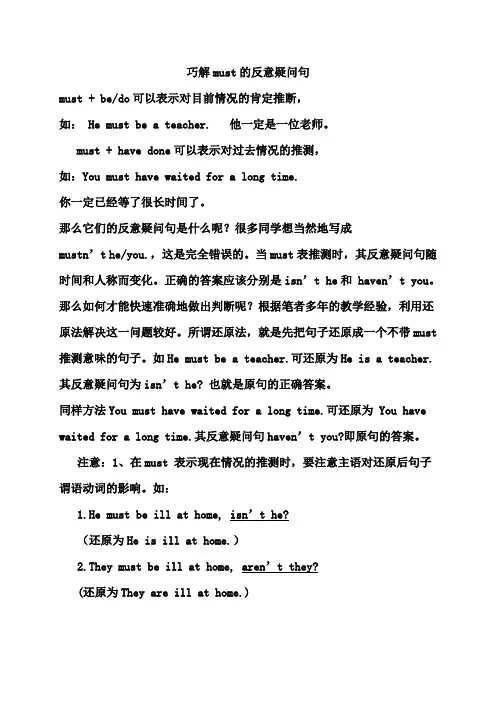
巧解must的反意疑问句must + be/do可以表示对目前情况的肯定推断,如: He must be a teacher. 他一定是一位老师。
must + have done可以表示对过去情况的推测,如:You must have waited for a long time.你一定已经等了很长时间了。
那么它们的反意疑问句是什么呢?很多同学想当然地写成mustn’t he/you.,这是完全错误的。
当must表推测时,其反意疑问句随时间和人称而变化。
正确的答案应该分别是isn’t he和 haven’t you。
那么如何才能快速准确地做出判断呢?根据笔者多年的教学经验,利用还原法解决这一问题较好。
所谓还原法,就是先把句子还原成一个不带must 推测意味的句子。
如He must be a teacher.可还原为He is a teacher.其反意疑问句为isn’t he? 也就是原句的正确答案。
同样方法You must have waited for a long time.可还原为 You have waited for a long time.其反意疑问句haven’t you?即原句的答案。
注意:1、在must 表示现在情况的推测时,要注意主语对还原后句子谓语动词的影响。
如:1.He must be ill at home, isn’t he?(还原为He is ill at home.)2.They must be ill at home, aren’t they?(还原为They are ill at home.)2、must 表示对过去的情况推测时,要注意句意和时间状语对还原后句子时态的影响。
如含有 for a long time, so far, before, since 等时间状语的句子还原后句子为完成时;而含有last night, yesterday, the other day, ten years ago 等时间状语的句子则还原为过去时。
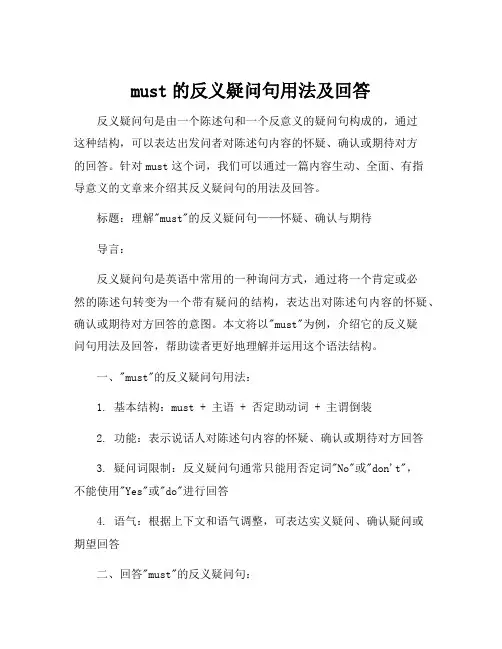
must的反义疑问句用法及回答反义疑问句是由一个陈述句和一个反意义的疑问句构成的,通过这种结构,可以表达出发问者对陈述句内容的怀疑、确认或期待对方的回答。
针对must这个词,我们可以通过一篇内容生动、全面、有指导意义的文章来介绍其反义疑问句的用法及回答。
标题:理解"must"的反义疑问句——怀疑、确认与期待导言:反义疑问句是英语中常用的一种询问方式,通过将一个肯定或必然的陈述句转变为一个带有疑问的结构,表达出对陈述句内容的怀疑、确认或期待对方回答的意图。
本文将以"must"为例,介绍它的反义疑问句用法及回答,帮助读者更好地理解并运用这个语法结构。
一、"must"的反义疑问句用法:1. 基本结构:must + 主语 + 否定助动词 + 主谓倒装2. 功能:表示说话人对陈述句内容的怀疑、确认或期待对方回答3. 疑问词限制:反义疑问句通常只能用否定词"No"或"don't",不能使用"Yes"或"do"进行回答4. 语气:根据上下文和语气调整,可表达实义疑问、确认疑问或期望回答二、回答"must"的反义疑问句:1. 实义疑问:Yes, 主语 + 肯定/否定陈述 OR No, 主语 + 肯定/否定陈述示例:A: You must be tired, aren't you?B: Yes, I am. / No, I'm not.2. 确认疑问:Yes, 主语 + 肯定/否定 OR No, 主语 + 肯定/否定示例:A: You must go to the party, don't you?B: Yes, I must. / No, I don't have to.3. 期待回答:回答时可以根据上下文和个人意愿做出选择,表达对主观或客观情况的期待示例:A: You must have enjoyed the movie, didn't you?B: Yes, I did. / No, I didn't like it that much.三、生动运用"must"的反义疑问句在日常交流中,反义疑问句可以让对话更具互动性,以下是一些常见场景:1. 对他人的行为或想法表示怀疑:A: He must be lying, isn't he?B: No, I don't think he would lie about it.2. 确认对方的观点或期待回答:A: You must be excited about the upcoming trip, aren't you?B: Yes, I can't wait to explore new places.3. 承认自己的责任或限制:A: I must apologize for my mistake, don't I?B: Yes, it would be the right thing to do.4. 判断对方的能力或技能:A: You must be good at playing the guitar, aren't you?B: No, I'm still learning and improving.结论:掌握"must"的反义疑问句的用法和回答,有助于更好地理解对方的观点、引导对话以及表达自己的态度。
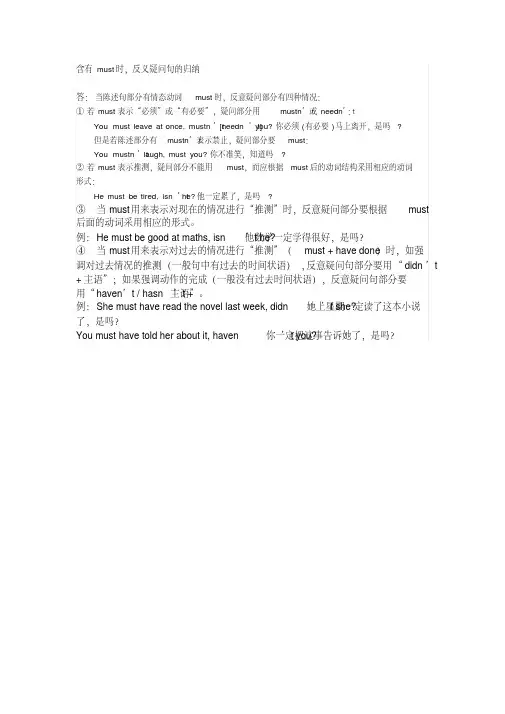
含有must时,反义疑问句的归纳
答:当陈述句部分有情态动词must时,反意疑问部分有四种情况:
:
①若must表示“必须”或“有必要”,疑问部分用mustn’t或needn’t
you?你必须(有必要)马上离开,是吗?
You must leave at once, mustn’t [needn’t]
但是若陈述部分有mustn’t表示禁止,疑问部分要must:
You mustn’t laugh, must you?你不准笑,知道吗?
②若must表示推测,疑问部分不能用must,而应根据must后的动词结构采用相应的动词
形式:
he?他一定累了,是吗?
He must be tired, isn’t
③当must用来表示对现在的情况进行“推测”时,反意疑问部分要根据must 后面的动词采用相应的形式。
他数学一定学得很好,是吗?
例:He must be good at maths, isn’t he?
④当must用来表示对过去的情况进行“推测”(must + have done)时,如强
调对过去情况的推测(一般句中有过去的时间状语),反意疑问句部分要用“didn’t + 主语”;如果强调动作的完成(一般没有过去时间状语),反意疑问句部分要
主语”。
用“haven’t / hasn’t +
她上星期一定读了这本小说例:She must have read the novel last week, didn’t she?
了,是吗?
你一定把这事告诉她了,是吗?
You must have told her about it, haven’t you?。
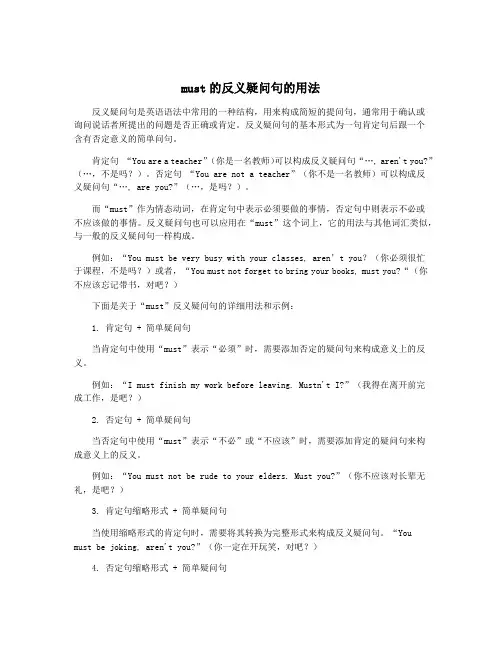
must的反义疑问句的用法反义疑问句是英语语法中常用的一种结构,用来构成简短的提问句,通常用于确认或询问说话者所提出的问题是否正确或肯定。
反义疑问句的基本形式为一句肯定句后跟一个含有否定意义的简单问句。
肯定句“You are a teacher”(你是一名教师)可以构成反义疑问句“…, aren't you?”(…,不是吗?)。
否定句“You are not a teacher”(你不是一名教师)可以构成反义疑问句“…, are you?”(…,是吗?)。
而“must”作为情态动词,在肯定句中表示必须要做的事情,否定句中则表示不必或不应该做的事情。
反义疑问句也可以应用在“must”这个词上,它的用法与其他词汇类似,与一般的反义疑问句一样构成。
例如:“You must be very busy with your classes, aren’t you?(你必须很忙于课程,不是吗?)或者,“You must not forget to bring your books, must you?“(你不应该忘记带书,对吧?)下面是关于“must”反义疑问句的详细用法和示例:1. 肯定句 + 简单疑问句当肯定句中使用“must”表示“必须”时,需要添加否定的疑问句来构成意义上的反义。
例如:“I must finish my work before leaving. Mustn't I?”(我得在离开前完成工作,是吧?)2. 否定句 + 简单疑问句当否定句中使用“must”表示“不必”或“不应该”时,需要添加肯定的疑问句来构成意义上的反义。
例如:“You must not be rude to your elders. Must you?”(你不应该对长辈无礼,是吧?)3. 肯定句缩略形式 + 简单疑问句当使用缩略形式的肯定句时,需要将其转换为完整形式来构成反义疑问句。
“You must be joking, aren't you?”(你一定在开玩笑,对吧?)4. 否定句缩略形式 + 简单疑问句当使用缩略形式的否定句时,需要将其转换为完整形式来构成反义疑问句。
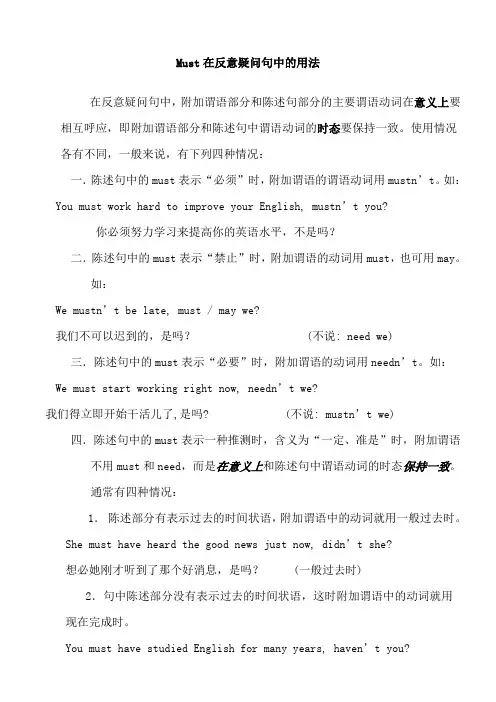
Must在反意疑问句中的用法在反意疑问句中,附加谓语部分和陈述句部分的主要谓语动词在意义上要相互呼应,即附加谓语部分和陈述句中谓语动词的时态要保持一致。
使用情况各有不同,一般来说,有下列四种情况:一.陈述句中的must表示“必须”时,附加谓语的谓语动词用mustn’t。
如:You must work hard to improve your English, mustn’t you?你必须努力学习来提高你的英语水平,不是吗?二.陈述句中的must表示“禁止”时,附加谓语的动词用must,也可用may。
如:We mustn’t be late, must / may we?我们不可以迟到的,是吗? (不说: need we)三.陈述句中的must表示“必要”时,附加谓语的动词用needn’t。
如:We must start working right now, needn’t we?我们得立即开始干活儿了,是吗? (不说: mustn’t we)四.陈述句中的must表示一种推测时,含义为“一定、准是”时,附加谓语不用must和need,而是在意义上和陈述句中谓语动词的时态保持一致。
通常有四种情况:1.陈述部分有表示过去的时间状语,附加谓语中的动词就用一般过去时。
She must have heard the good news just now, didn’t she?想必她刚才听到了那个好消息,是吗? (一般过去时)2.句中陈述部分没有表示过去的时间状语,这时附加谓语中的动词就用现在完成时。
You must have studied English for many years, haven’t you?你一定学了多年的英语,不是吗? (现在完成时)3.陈述部分的动词表示经常性的动作或状态,附加谓语部分的动词就用一般现在时。
He must be from the south, isn’t he?他一定是南方人,对吗? (一般现在时)4.陈述句部分的谓语动词为现在进行时,也需要时态上的呼应。
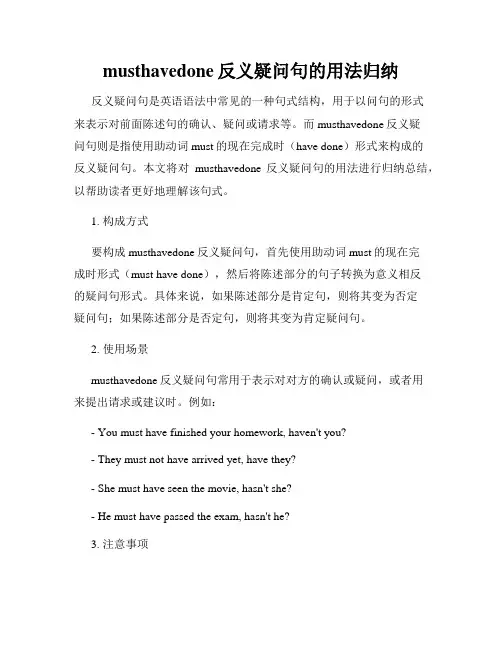
musthavedone反义疑问句的用法归纳反义疑问句是英语语法中常见的一种句式结构,用于以问句的形式来表示对前面陈述句的确认、疑问或请求等。
而musthavedone反义疑问句则是指使用助动词must的现在完成时(have done)形式来构成的反义疑问句。
本文将对musthavedone反义疑问句的用法进行归纳总结,以帮助读者更好地理解该句式。
1. 构成方式要构成musthavedone反义疑问句,首先使用助动词must的现在完成时形式(must have done),然后将陈述部分的句子转换为意义相反的疑问句形式。
具体来说,如果陈述部分是肯定句,则将其变为否定疑问句;如果陈述部分是否定句,则将其变为肯定疑问句。
2. 使用场景musthavedone反义疑问句常用于表示对对方的确认或疑问,或者用来提出请求或建议时。
例如:- You must have finished your homework, haven't you?- They must not have arrived yet, have they?- She must have seen the movie, hasn't she?- He must have passed the exam, hasn't he?3. 注意事项(1)在musthavedone反义疑问句中,陈述部分的动词通常使用过去分词形式(done)。
需要注意的是,过去分词的形式要与主语保持一致。
(2)助动词must的变体形式要根据所使用的人称和时态进行调整。
例如,如果陈述部分是现在完成时,那么助动词must必须是must have done的形式。
(3)反义疑问句的疑问部分的语序与一般疑问句相同,即将助动词提前至主语之前。
4.表示肯定的陈述部分在使用musthavedone反义疑问句时,如果陈述部分是肯定的,则将其转换为否定疑问句。
例如:- You must have finished your homework, haven't you?- They must have won the game, haven't they?- She must have visited her parents, hasn't she?- He must have bought a new car, hasn't he?在这些例句中,陈述部分都是肯定句,通过将其转换为否定疑问句,可以表示对所陈述事实的确认,并且期待对方给出与自己观点相反的回答。
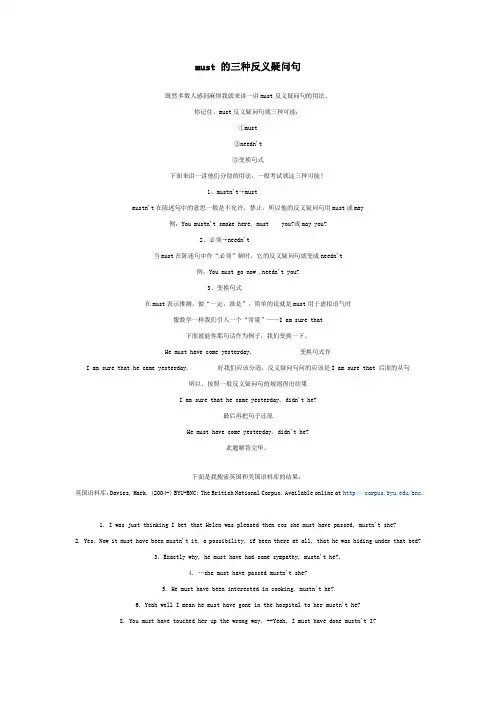
must 的三种反义疑问句既然多数人感到麻烦我就来讲一讲must反义疑问句的用法。
你记住,must反义疑问句就三种可能:①must②needn't③变换句式下面来讲一讲他们分别的用法,一般考试就这三种可能!1、mustn't→mustmustn't在陈述句中的意思一般是不允许,禁止,所以他的反义疑问句用must或may例:You mustn't smoke here, must you?或may you?2、必须→needn't当must在陈述句中作“必须”解时,它的反义疑问句就变成needn't例:You must go now ,needn't you?3、变换句式在must表示推测,做“一定,准是”,简单的说就是must用于虚拟语气时像数学一样我们引入一个“常量”——I am sure that下面就能你那句话作为例子,我们变换一下。
He must have come yesterday. 变换句式作I am sure that he came yesterday. 好我们应该分清,反义疑问句问的应该是I am sure that 后面的从句所以,按照一般反义疑问句的规则得出结果I am sure that he came yesterday, didn't he?最后再把句子还原He must have come yesterday,didn't he?此题解答完毕。
下面是我搜索英国和美国语料库的结果:英国语料库:Davies, Mark. (2004-) BYU-BNC: The British National Corpus. Available online at /bnc.1. I was just thinking I bet that Helen was pleased then cos she must have passed, mustn't she?2. Yes. Now it must have been mustn't it, a possibility, if been there at all, that he was hiding under that bed?3. Exactly why, he must have had some sympathy, mustn't he?.4. …she must have passed mustn't she?5. He must have been interested in cooking, mustn't he?6. Yeah well I mean he must have gone in the hospital to her mustn't he?8. You must have touched her up the wrong way. --Yeah, I must have done mustn't I?9. Now it must have been mustn't it, a possibility, if been there at all, that he was hiding under that bed?10. Exactly why, he must have had some sympathy, mustn't he?.11. He must have been interested in cooking, mustn't he?12. Yeah well I mean he must have gone in the hospital to her mustn't he?13. Yeah, I must have done mustn't I?14. Somebody must have reported him, though, mustn't they?15. Abruptly she stood up and crossed to the window. "I must have done , mustn't I?"16. You must have seen the seals, though, didn't you?17. Exactly why, he must have had some sympathy , mustn't he ?.18. And your sister's ten years older than you so they must 've been there ten years plus , mustn't they ?19. They have a serious side but they must have a lighter side as well , mustn't they ?20. It must be , mustn't it ?21. Yeah. The profit would have been minus cos the costs would still be there so it must be a cancellation . Mustn'tit ?22. Yes, now this shows it must be his imagination , mustn't it ?23. …they must know there is a risk , mustn't they .24. It must mean something , mustn't it ?25. Six pairs of knickers must be enough , mustn't it , Charlie?26. Then it must be Madame V in Paris , mustn't it ?27. Everybody who sees her must love her , mustn't they , Ellen?28. But he must like her a bit , mustn't he ?29. Saturday night. Yeah? Yeah. So he must be doing well, mustn’t he?30. Yeah. Okay. So what, they mus t be staying, staying the Saturday night, mustn’t they?31. You must have seen the seals, though, didn’t you?(用didn't的只搜到这一例)美国语料库:/1. You must have enjoyed those, didn't you?2. And you must have had a name, didn't you?3. Oh Patrick, I must have told you -- didn't I?4. Must have seemed like an eternity, didn't it, holding your breath?5. Must have had three kids, did she?6. I'm sure they must be exaggerating, aren't they, Professor?7. You must have called an undertaker by now, haven't you?还是英国语料库:推断:It must mean something , mustn't it?Everybody who sees her must love her , mustn't they, Ellen?But he must like her a bit , mustn't he?Yes, now this shows it must be his imagination , mustn't it?he must have had some sympathy , mustn't he?必须:Well they must do them Sarah , mustn't they?First I must wash , mustn't I?。
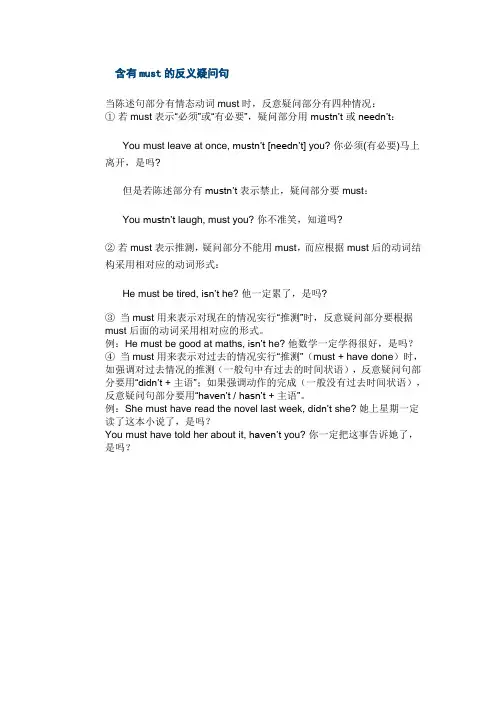
含有must的反义疑问句
当陈述句部分有情态动词must时,反意疑问部分有四种情况:
①若must表示“必须”或“有必要”,疑问部分用mustn’t或needn’t:
You must leave at once, mustn’t[needn’t] you? 你必须(有必要)马上离开,是吗?
但是若陈述部分有mustn’t表示禁止,疑问部分要must:
You mustn’t laugh, must you? 你不准笑,知道吗?
②若must表示推测,疑问部分不能用must,而应根据must后的动词结构采用相对应的动词形式:
He must be tired, isn’t he? 他一定累了,是吗?
③当must用来表示对现在的情况实行“推测”时,反意疑问部分要根据must后面的动词采用相对应的形式。
例:He must be good at maths, isn’t he? 他数学一定学得很好,是吗?
④当must用来表示对过去的情况实行“推测”(must + have done)时,如强调对过去情况的推测(一般句中有过去的时间状语),反意疑问句部分要用“didn’t + 主语”;如果强调动作的完成(一般没有过去时间状语),反意疑问句部分要用“haven’t / hasn’t + 主语”。
例:She must have read the novel last week, didn’t she? 她上星期一定读了这本小说了,是吗?
You must have told her about it, haven’t you? 你一定把这事告诉她了,是吗?。
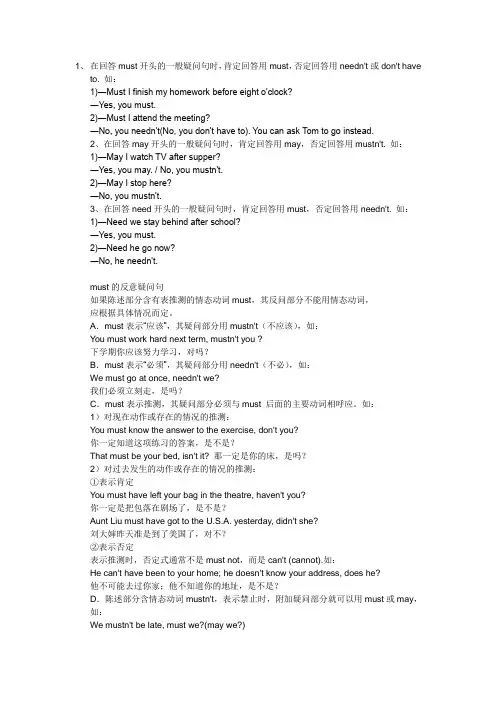
1、在回答must开头的一般疑问句时,肯定回答用must,否定回答用needn't或don't haveto. 如:1)―Must I finish my homework before eight o'clock?―Yes, you must.2)―Must I attend the meeting?―No, you needn't(No, you don't have to). You can ask Tom to go instead.2、在回答may开头的一般疑问句时,肯定回答用may,否定回答用mustn't. 如:1)―May I watch TV after supper?―Yes, you may. / No, you mustn't.2)―May I stop here?―No, you mustn't.3、在回答need开头的一般疑问句时,肯定回答用must,否定回答用needn't. 如:1)―Need we stay behind after school?―Yes, you must.2)―Need he go now?―No, he needn't.must的反意疑问句如果陈述部分含有表推测的情态动词must,其反问部分不能用情态动词,应根据具体情况而定。
A.must表示“应该”,其疑问部分用mustn't(不应该),如:You must work hard next term, mustn't you ?下学期你应该努力学习,对吗?B.must表示“必须”,其疑问部分用needn't(不必),如:We must go at once, needn't we?我们必须立刻走,是吗?C.must表示推测,其疑问部分必须与must 后面的主要动词相呼应。
如:1)对现在动作或存在的情况的推测:You must know the answer to the exercise, don't you?你一定知道这项练习的答案,是不是?That must be your bed, isn't it? 那一定是你的床,是吗?2)对过去发生的动作或存在的情况的推测:①表示肯定You must have left your bag in the theatre, haven't you?你一定是把包落在剧场了,是不是?Aunt Liu must have got to the U.S.A. yesterday, didn't she?刘大婶昨天准是到了美国了,对不?②表示否定表示推测时,否定式通常不是must not,而是can't (cannot).如:He can't have been to your home; he doesn't know your address, does he?他不可能去过你家;他不知道你的地址,是不是?D.陈述部分含情态动词mustn't,表示禁止时,附加疑问部分就可以用must或may,如:We mustn't be late, must we?(may we?)我们不可以迟到,是吗?need带情态动词need的反意疑问句,疑问部分常用need +主语。
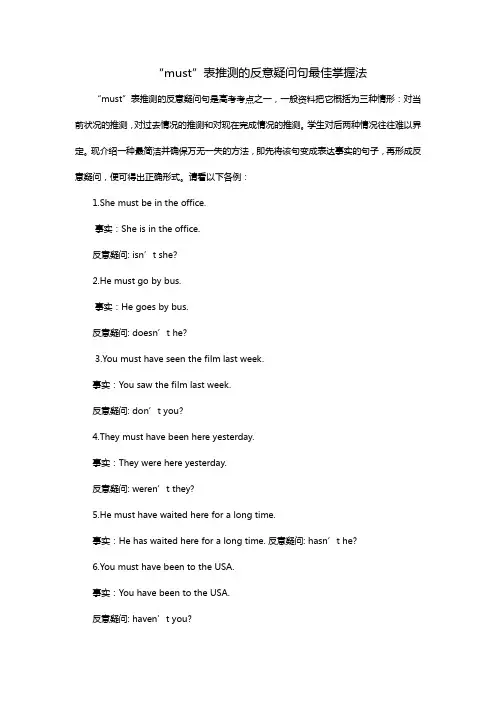
“must”表推测的反意疑问句最佳掌握法“must”表推测的反意疑问句是高考考点之一,一般资料把它概括为三种情形:对当前状况的推测,对过去情况的推测和对现在完成情况的推测。
学生对后两种情况往往难以界定。
现介绍一种最简洁并确保万无一失的方法,即先将该句变成表达事实的句子,再形成反意疑问,便可得出正确形式。
请看以下各例:
1.She must be in the office.
事实:She is in the office.
反意疑问: isn’t she?
2.He must go by bus.
事实:He goes by bus.
反意疑问: doesn’t he?
3.You must have seen the film last week.
事实:You saw the film last week.
反意疑问: don’t you?
4.They must have been here yesterday.
事实:They were here yesterday.
反意疑问: weren’t they?
5.He must have waited here for a long time.
事实:He has waited here for a long time. 反意疑问: hasn’t he?
6.You must have been to the USA.
事实:You have been to the USA.
反意疑问: haven’t you?。
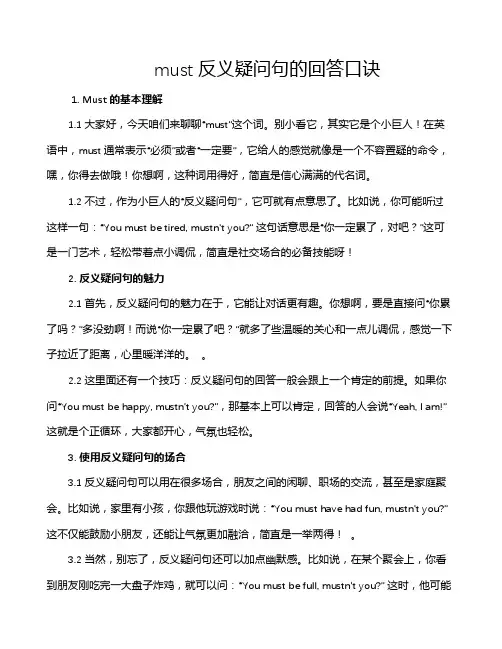
must反义疑问句的回答口诀1. Must的基本理解1.1 大家好,今天咱们来聊聊“must”这个词。
别小看它,其实它是个小巨人!在英语中,must通常表示“必须”或者“一定要”,它给人的感觉就像是一个不容置疑的命令,嘿,你得去做哦!你想啊,这种词用得好,简直是信心满满的代名词。
1.2 不过,作为小巨人的“反义疑问句”,它可就有点意思了。
比如说,你可能听过这样一句:“You must be tired, mustn't you?” 这句话意思是“你一定累了,对吧?”这可是一门艺术,轻松带着点小调侃,简直是社交场合的必备技能呀!2. 反义疑问句的魅力2.1 首先,反义疑问句的魅力在于,它能让对话更有趣。
你想啊,要是直接问“你累了吗?”多没劲啊!而说“你一定累了吧?”就多了些温暖的关心和一点儿调侃,感觉一下子拉近了距离,心里暖洋洋的。
2.2 这里面还有一个技巧:反义疑问句的回答一般会跟上一个肯定的前提。
如果你问“You must be happy, mustn't you?”,那基本上可以肯定,回答的人会说“Yeah, I am!” 这就是个正循环,大家都开心,气氛也轻松。
3. 使用反义疑问句的场合3.1 反义疑问句可以用在很多场合,朋友之间的闲聊、职场的交流,甚至是家庭聚会。
比如说,家里有小孩,你跟他玩游戏时说:“You must have had fun, mustn't you?” 这不仅能鼓励小朋友,还能让气氛更加融洽,简直是一举两得!。
3.2 当然,别忘了,反义疑问句还可以加点幽默感。
比如说,在某个聚会上,你看到朋友刚吃完一大盘子炸鸡,就可以问:“You must be full, mustn't you?”这时,他可能会哈哈大笑,心里想“哪里够呢?我还想再来一盘!”这种小互动,总是让人觉得暖心又有趣。
4. 如何正确使用反义疑问句4.1 说了这么多,咱们再来看看怎么正确使用反义疑问句。
must的反义疑问句反义疑问句是高中非常重要的英语语法知识,由于反义疑问句复杂多变的形式和不同常规的回答,让很多考生视为难点。
其中尤以must反义疑问句(must出现在反义疑问句的陈述部分)最为复杂。
其实must反义疑问句只有以下三种情况,掌握must反义疑问句三种情况就能轻松对付考试。
must的三种反义疑问句形式(1) must出现在肯定陈述句中,表示"必须"的意思,此时疑问部分通常用"needn't"。
例句1:You must take off your shoes when getting into the room, needn't you?进入房间时你必须要脱掉鞋子,不是吗?例句2:You must stay here and return the purse to the owner, needn't you?你必须呆在这把钱包交还给失主,不是吗?(2) must表示"必须"出现在否定陈述句中(即陈述部分用到must not或者mustn't,意思为"不允许,禁止"),此时疑问部分通常用"must"或者用"may"。
例句1:You mustn't trample on the grass, must you/may you?你不能践踏草坪,对吧?例句2:You mustn't smoke in public places, must you/may you?你不能在公共场合抽烟,对吧?(3) must出现在陈述部分作为一种肯定的推测,表示"一定,肯定"的意思,此时疑问部分需要根据实际语意来确定。
例句1:He must be angry, isn't he?他肯定生气了,对吗?例句2:You must be hungry, aren't you?你肯定饿了,对吧?例句3:She must have got married, hasn't she?她肯定已经结婚了,对吗?注释:本句中"she must have got married"是对"she has got married"的肯定性强调,所以反义疑问句应该用"hasn't she"。
Must的反义疑问句:当陈述部分有情态动词must,问句有4种情况:(1)mustn't表示“禁止,不可,不必”时,附加问句通常要用must.You mustn't stop your car here,must you?你不能把车停在这地方,知道吗?(2)must表示“有必要”时,附加问句通常要用needn't.They must finish the work today,needn't they?他们今天要完成这项工作,是吗?(3)当must用来表示对现在的情况进行推测时,问句通常要根据must后面的动词采用相应的形式。
He must be good at English,isn't he?他英语一定学得很好,是吗?(4)当must+have done表示对过去的情况进行推测(一般句中有明确的过去时间状语),问句要根据陈述部分谓语的情况用“didn't+主语”或“wasn't/weren't+主语”;如果强调动作的完成(一般没有明确的过去时间状语),问句要用“haven't/hasn't+主语”。
She must have read the novel last week,didn't she?她上星期一定读了这本小说,是吗?You must have told her about it,haven't you?你一定把这事告诉她了,是吗?need的反义疑问句:need的用法分为两种,一种是作为情态动词,一种是作为实义动词。
一般而言,need作为情态动词是在否定句(有时为疑问句中),此种情况在反义疑问句中通常为need I或needn't I,而当这句话是一句肯定句是,这里的need就作为实义动词,通常为do you或者是don't you就比如LZ说的句子I needn’t tell you the answer , need I ?这里need为情态动词,前面否定,后用need肯定You need to buy a better dictionary , don’t you ? 这里need为实义动词,前面肯定,所以后面用do的否定形式don't说起will,我不明白LZ是什么意思,与will有关的知识点整理在这里开头为Let's,后面一定用shall +we例:Let's go,shall we开头为Let us,后面一定用will you例:Let us go,will youthink, believe, suppose, imagine, expect等动词后接宾语从句构成的主从复合句在构成反意疑问句时,视情况不同有两种不同的构成方式。
含情态动词must的反义疑问句陈述部分有must,且表示"必须"时,附加疑问句部分用mustn't,如果表示"必要"则用needn 't。
陈述部分中是mustn't表示"禁止"时,附加疑问句部分用must。
陈述部分中的must表示"一定"、"想必"等推测意义时,附加疑问句部分而是根据陈述部分的谓语动词或其助动词来定。
They must clean the floor, mustn't they/needn't they?他们必须擦地板,是不是?We must stay at home, mustn't we?我们必须留在家里,是不是?We mustn't be late, must/may we?我们不许迟到,是不是?They must work hard, mustn't they?(必须)They must take medical lessons, needn't they?(必要)He must be lying to me, _____?A.mustn't beB.must beC.isn't beD.is be"他肯定在对我说谎。
"must be doing 是对正在进行的事情的推断。
还有must have done 是对过去情况的肯定推断。
must 这种用法的反意疑问句不用 must 提问。
推断用法:He must be lying to me.陈述用法:He is lying to me.陈述用法反意疑问句:He is lying to me, isn't he?推断用法反意疑问句:He must be lying to me, isn't he?推断用法:He must have been abroad.陈述用法:He has been abroad.陈述用法反意疑问句:He has been abroad, hasn't he?推断用法反意疑问句:He must have been abroad, hasn't he?推断用法:He must have gone swimming yesterday.陈述用法:He went swimming yesterday.陈述用法反意疑问句:He went swimming yesterday, didn't he?推断用法反意疑问句:He must have gone swimming yesterday, didn't he?He must be a visitor, isn't he?(对现在情况的推测)You must have seen him at his birthday party yesterday, didn't you?(对过去情况的推测,且句中有过去的时间状语)You must have seen him at his birthday party,haven't you?(强调动作的完成)1 带have to 时,附加疑问用do 或have的相应形式, 用do 更常见。
反义疑问句must的用法及回答解析反义疑问句是一种特殊的疑问句,它由一个陈述句和一个与之相反意义的简短疑问句构成,用来表示说话人对某事的看法或态度,或者征求对方的意见或同意。
反义疑问句中,如果陈述部分有情态动词must,那么根据must 的不同含义和语气,反意疑问部分有四种可能的形式:mustn't, needn't, didn't或haven't/hasn't。
本文将分别介绍这四种情况的用法及回答,并给出一些例句和练习。
一、must表示“必须”或“有必要”当陈述部分的must表示“必须”或“有必要”时,反意疑问部分通常用mustn't或needn't。
这两种形式都可以表示说话人对陈述部分的肯定或强调,但是mustn't更加强烈,而needn't更加委婉。
例如:You must leave at once, mustn't you? 你必须马上离开,是吗?(强调必要性)You must leave at once, needn't you? 你必须马上离开,是吗?(询问是否必要)回答这种反义疑问句时,如果同意陈述部分,可以用Yes, I must. 或Yes, I do.;如果不同意陈述部分,可以用No, I needn't. 或No, I don't have to.。
例如:You must leave at once, mustn't you? 你必须马上离开,是吗?Yes, I must. 是的,我必须。
No, I needn't. 不,我不必。
No, I don't have to. 不,我不用。
二、must表示“推测”当陈述部分的must表示“推测”时,反意疑问部分不能用must,而应根据must后面的动词结构采用相应的动词形式。
例如:He must be tired, isn't he? 他一定累了,是吗?(根据be动词用isn't)They must have arrived by now, haven't they? 他们现在一定已经到了,是吗?(根据have done结构用haven't)回答这种反义疑问句时,如果同意陈述部分,可以用Yes, he is. 或Yes, they have.;如果不同意陈述部分,可以用No, he isn't. 或No, they haven't.。
反义疑问句(含解析、例句及详尽用法)-CAL-FENGHAI.-(YICAI)-Company One1反义疑问句一、祈使句的反义疑问句1、肯定祈使句Will you/won’t you2、否定祈使句Will you3、Let的祈使句Let us ...,will you(此处Let us 表示“允许我们...”)Let’s...,shall we (此处Let’s表示“让我们...吧”)Let + 第三人称...,will you二、Must的反义疑问句1、表示“必须” musn’t /needn’tEg. You must go now, needn’t you2、表示“不准”Eg. You musn’t smoke here, must/may you3、表示推测,肯定。
(I’m sure + 从句)Eg. You must be hungry now, aren’t youI’m sure you are hungry now, aren’t youShe must have heard about that, hasn’t sheI’m sure you have heard about that, haven’t youYou must have watched that movie last night, didn’t you(last nigh为具体时间点,所以用一般过去式)三、主语(反义疑问句)+从句主句:I(don’t)think/believe/consider/suppose 或 I’m afraid/sure...后跟从句时,可将从句部分进行反义疑问Eg. I don’t think he will win, will heI think he will win, won’t heShe thinks he will win, doesn’t she(当主句主语不是I时不适用于该用法,此句中的翻译疑问针对的是主句而非从句)四、当句中包含有表示否定意义的副词或不定代词时,反义疑问句用肯定形式Eg. Nothing happened to him, did itIt is unfair, isn’t itHe dislikes watching TV, doesn’t he(该句中含否定意义的是动词而非副词或不定代词,因此不适用于该用法,反义疑问句仍然使用否定形式)五、反义疑问句的回答反义疑问句的回答针对被提问部分的谓语动词,且与回答句前部分的Yes和No 保持一致Eg. A: You haven’t lost the ticket, have youB: D I know it’s hard to get another one at this moment.A. Yes, I haven’tB. No, I haveC. I hope soD. I’m afraid not六、陈述部分的主语与反义疑问句主语保持一致的情况1、OneEg. One can’t be too careful when driving a car, can one/he一个人在开车的时候再怎么小心也不为过。
A.当need 是及物动词的时候A fence needs the support of three stakes,doesn’t it?B.当 need 是情态动词的时候You needn’t come tomorrow morning,need you?2.must 的反义疑问句A.当must 表推测时You must be tired,aren’t you?must have done对已发生的过去情况的推测.若陈述句谓语部分有“must have done”,而且有表示过去的时间状语,问句部分用didn't;若没有表示过去的时间状语,问句部分用haven't或hasn't。
You must have made the mistake,haven’t you?They must have stayed at home last night,didn’t they?B.当must 为情态动词时You mustn’t walk on grass,must you?3.不定代词的反义疑问句A.指人的不定代词Everyone is having a good time,aren’t they?B.指物的不定代词1.Nothing serious happened,did it?2.Everything goes well,doesn’t it?4.判断反义主句还是从句A.主语是第I,从句反问I suppose you are not going today,are you?B.主语不是I,主句反问。
有些从句即使是I,但动词如果是tell,还是要主句反问。
I told them not everybody could do it,didn’t I?5.There used to be的反义疑问句There used to be bus stop on that corner,didn’t there?Pass me the dictionary,will you? Let’s go,shall we?Let us go,will you?。
Must在反意疑问句中的用法
在反意疑问句中,附加谓语部分和陈述句部分的主要谓语动词在意义上要相互呼应,即附加谓语部分和陈述句中谓语动词的时态要保持一致。
使用情况各有不同,一般来说,有下列四种情况:
一.陈述句中的must表示“必须”时,附加谓语的谓语动词用mustn’t。
如:
You must work hard to improve your English, mustn’t you?
你必须努力学习来提高你的英语水平,不是吗?
二.陈述句中的must表示“禁止”时,附加谓语的动词用must,也可用may。
如:
We mustn’t be late, must / may we?
我们不可以迟到的,是吗?(不说: need we)
三.陈述句中的must表示“必要”时,附加谓语的动词用needn’t。
如:
We must start working right now, needn’t we?
我们得立即开始干活儿了,是吗? (不说: mustn’t we)
四.陈述句中的must表示一种推测时,含义为“一定、准是”时,附加谓语不用must和need,而是在意义上和陈述句中谓语动词的时态保持一致。
通常有四种情况:
1.陈述部分有表示过去的时间状语,附加谓语中的动词就用一般过去时。
She must have heard the good news just now, didn’t she?
想必她刚才听到了那个好消息,是吗?(一般过去时)
2.句中陈述部分没有表示过去的时间状语,这时附加谓语中的动词就用
现在完成时。
You must have studied English for many yea rs, haven’t you?
你一定学了多年的英语,不是吗?(现在完成时)
3.陈述部分的动词表示经常性的动作或状态,附加谓语部分的动词就用
一般现在时。
He must be from the south, isn’t he?
他一定是南方人,对吗?(一般现在时)
4.陈述句部分的谓语动词为现在进行时,也需要时态上的呼应。
I think they must be watching this exciting football matc h now, aren’t they?
想必他们正在观看这场精彩的足球赛。
(现在进行时)
这些都是有一个网站上的,但是我还有问题是:
那么请问:如果是这种情况
“2.句中陈述部分没有表示过去的时间状语,这时附加谓语中的动词就用
现在完成时。
You must have studied English for many years, haven’t you?
你一定学了多年的英语,不是吗?(现在完成时)”
可是前面不是现在完成时,如:you must did this thing ,______?(你一定做了这件事,不是吗?)
那么后面添什么呢?
还是说,一定要用have?must后面要加动词原形?
提问者:快。